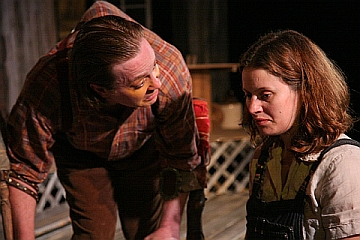Strong Performances Tempered By A Problematic Script
By Julienne Bilker in Arts & Entertainment on Aug 14, 2009 4:00PM

photo of Aaron Snook and Simone Roos by Johnny Knight
Set in a small town in Depression-era Georgia, the show starts from the moment the house opens. A three-person porch jug-band - minus the jug but including a washtub bass - serenades the audience at the start and provides all of the play’s music throughout. Melania Lancy’s set is picture-perfect and especially commendable given the theater’s physical constraints.
The story centers on Amelia (Simone Roos), a tomboyish, hard young woman who runs the town general store and makes the best liquor around. Amelia is softened when a hunchback claiming to be her Cousin Lymon (Aaron Snook) shows up on her doorstep, taking him in, caring for him, and turning her store into a café so he will have people to talk to. Their arrangement hits a major snag when Marvin Macy (Philip Winston), Amelia’s spurned husband who has been in jail for years, returns seeking revenge for the agony she caused him. Cousin Lymon turns on Amelia, becoming Marvin’s ally, and as you might guess, things do not end well.
Roos is tough-as-nails with exacting, often subtle flashes of vulnerability. Snook hits a perfect level of insidiousness, and deserves extra kudos for spending the entire show hunched with his head at a toddler’s eye-level. Alternately pitifully sympathetic and frighteningly maniacal, Winston’s earnestness is striking. As Marvin’s brother Henry, Joseph Stearns’ incredibly palpable guilt twisted our stomachs even when he sat in the background. Vincent L. Lonergan (The Narrator) drives the entire story with a measured amount of urgency while keeping the tone and pace steady in a way we can best describe as pulling taffy. Really, really thick taffy. The kind that you have to pull slowly because you’re physically incapable of pulling it any faster. What we’re trying to say is, the show felt long and drawn out, but it still seemed like the correct way to treat the script. Which brings us back to the criticism we so casually tossed out in the headline.
We couldn’t wrap our heads around why Amelia married Marvin in the first place -- it can be chalked up to loneliness, but that assumption isn’t necessarily supported by the text -- or why Lymon betrays Amelia so easily and in such an alarmingly vindictive, dangerous way. Yes, he feels deceived when he finds out about her marriage from the townspeople instead of her, but for us, the crime doesn’t match the punishment. These questions loomed large throughout much of the play, causing our patience to diminish at an increasing rate as it sauntered along its two-plus taffy-pulling hours. We consulted our literary experts, who assured us that McCullers’ original story leaves these issues for the reader to interpret - it’s a kind of ambiguity that might work fine in print, but comes across as weakness on stage. Despite committed, passionate performances from the entire ensemble, we left the theater frustrated and unsatisfied.
The Ballad of the Sad Cafe, through September 12. Signal Ensemble Theatre at Chopin Theatre, 1543 W. Division Ave. Tickets $15-$20 (industry/student/senior/group discounts available), 773-347-1350.